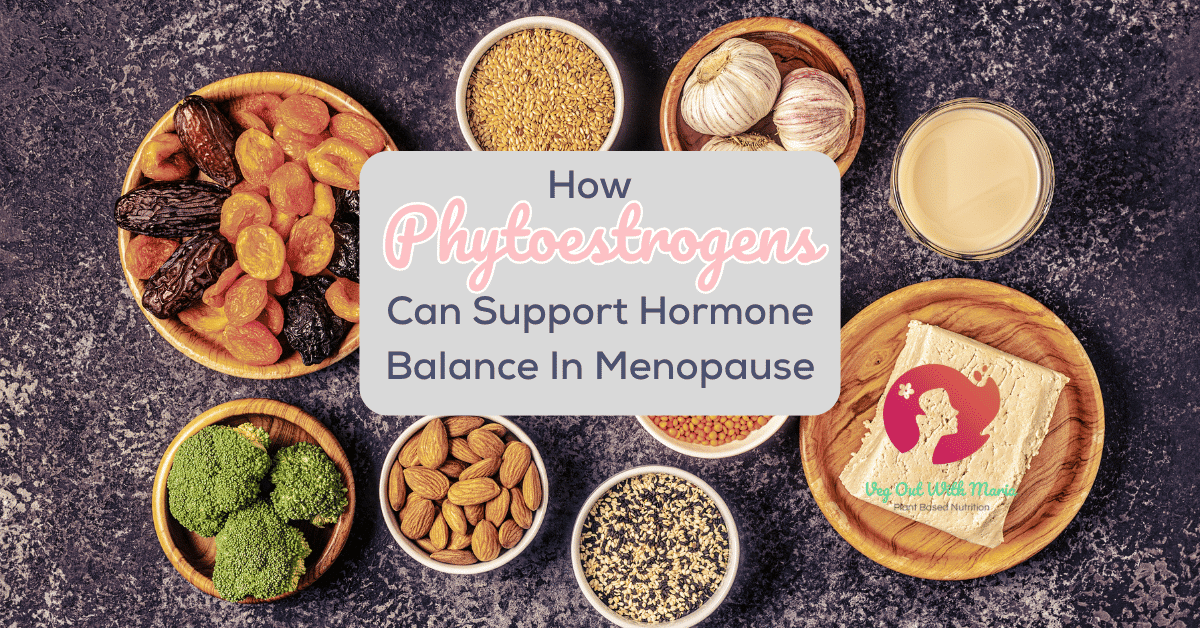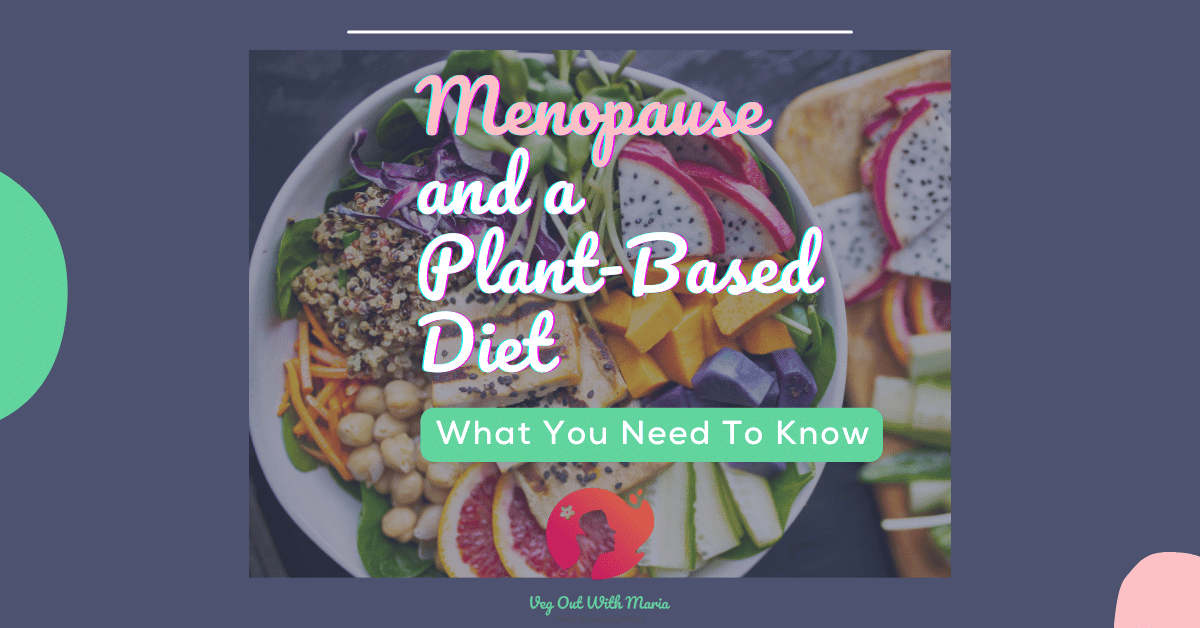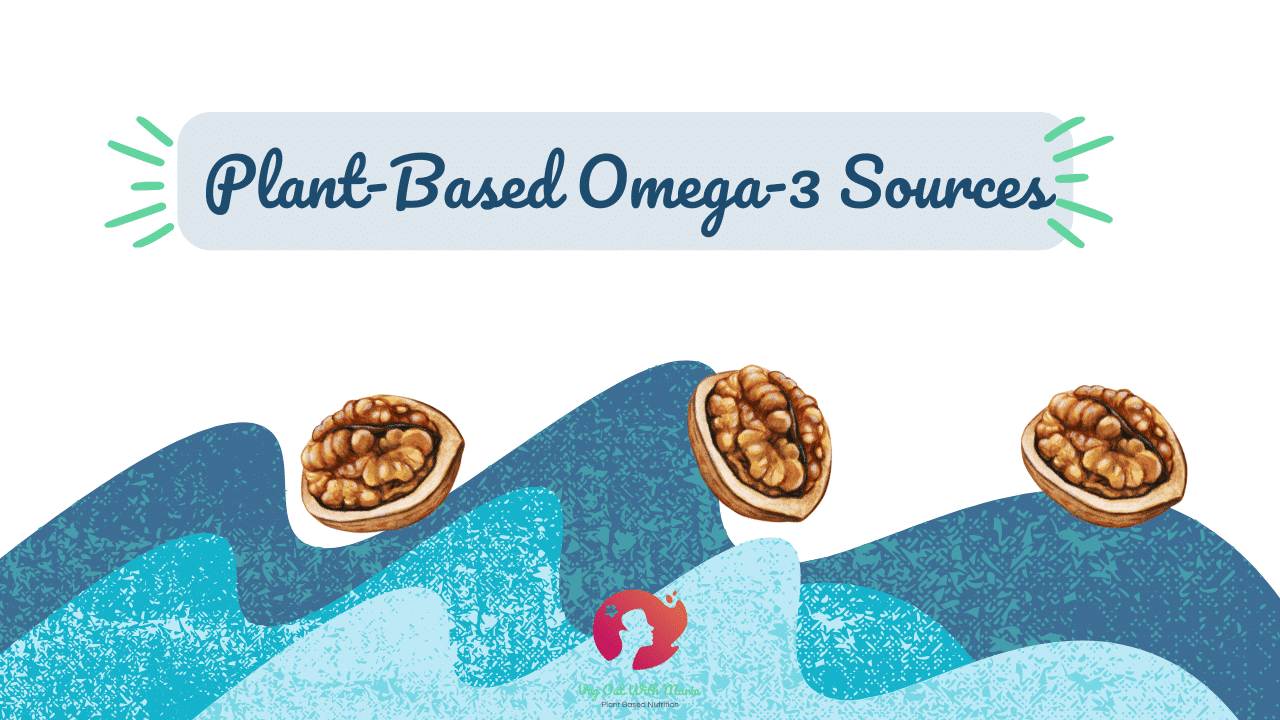Updated 10/18/2025
You’ve probably heard all about the benefits of omega-3 fatty acids – from heart health to glowing skin. But if you’re plant-based, you might wonder: Are they really essential? And if so, can you get enough from plants alone – or do you need a supplement?
Let’s break it down. In this post, we’ll cover what omega-3s actually are, why they matter, the best plant-based sources, and whether supplements are worth considering.
What are Fatty Acids, Anyway?
Just like proteins are made of amino acids, fats are made of fatty acids. During digestion, your body breaks down fats into these building blocks, which are then absorbed into your bloodstream and used for everything from energy to hormone production.
There are three main types:
- Saturated fats
- Unsaturated fats
- Trans fats
Unsaturated fats are the “healthy” ones, and they’re further divided into monounsaturated and polyunsaturated fats. Omega-3s belong to the latter group.
Let’s do a quick refresher.
Saturated Fat
Saturated fats are “saturated” with hydrogen atoms and contain only single bonds between carbon atoms. They tend to be solid at room temperature (think butter or refined coconut oil) and can raise LDL (“bad”) cholesterol, increasing your risk for heart disease and stroke.
Trans Fat
Trans fats can occur naturally in meat and dairy, but are also created artificially through partial hydrogenation. These man-made trans fats are public enemy number one when it comes to heart health – they raise LDL, lower HDL (“good” cholesterol), and increase your risk for heart disease, stroke, and type 2 diabetes 1.
Unsaturated Fat
These are your heart-healthy fats, found mostly in plant foods. They help lower cholesterol and reduce heart disease risk when eaten in moderation.
Two main types:
- Monounsaturated fats (MUFAs): Found in olive oil, avocados, peanuts, and certain nuts and seeds.
- Polyunsaturated fats (PUFAs): Found in foods like walnuts, flaxseeds, and certain plant oils — and include omega-3 and omega-6 fatty acids.
Both omega-3 and omega-6 are essential, meaning your body can’t make them on its own. You’ve got to get them from your diet.
What are Omega 3s?
Omega-3 fatty acids are a type of polyunsaturated fat that play a crucial role in cell health, brain function, and inflammation regulation. There are three main types:
- ALA (alpha-linolenic acid): Found in plant foods like flaxseeds, chia seeds, and walnuts.
- EPA (eicosapentaenoic acid): Found mainly in fish and algae.
- DHA (docosahexaenoic acid): Also found in fish and algae.
ALA is the only omega-3 formally recognized as essential and the only omega-3 that has a dietary reference intake. Some of ALA can be converted into EPA. A very small amount can be converted into DHA.
All 3 types of omega-3s are important, but that does not mean that you need to eat fish or take a fish oil supplement to get DHA and EPA. Interestingly, research suggests that vegetarians and vegans may have a slightly higher conversion rate 2,3.
That’s your body being smart, finding out how to get what it needs. Just as your body can extract from the pool of amino acids that we get in our diet to make up “complete proteins.”
And don’t count ALA out – it has its own proven benefits, independent of EPA and DHA. 4.
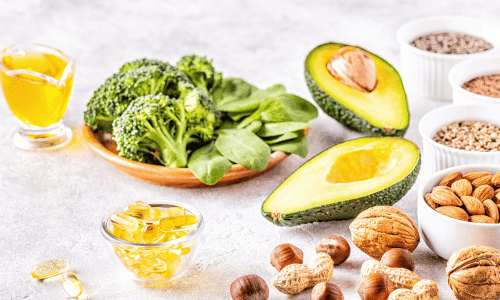
Benefits of Omega 3s
Omega-3s are essential for every cell in your body. Here’s what they do best:
1. Heart Health
Omega-3s have been shown to lower your risk for heart disease by lowering triglyceride levels (fats in the blood) and may also help to increase your “good” HDL cholesterol and improve blood pressure5.
2. Brain Health
Omega-3 fatty acids play a crucial role in brain health. DHA, in particular, is a key structural component of brain cell membranes and supports communication between brain cells. Adequate omega-3 intake has been linked to improved memory, mood regulation, and reduced risk of cognitive decline, including Alzheimer’s disease and dementia6.
During pregnancy and early life, omega-3s are essential for proper brain and nervous system development.7
3. Anti-Inflammatory
Another benefit of omega-3s is the ability to reduce inflammation in the body8,9. Chronic inflammation can contribute to heart disease, cancer, and other chronic diseases.
4. Eye Health
DHA levels are especially high in the retina of the eye. Although more studies are needed, omega-3s have been associated with improvement in dry eye and may help prevent macular degeneration10. (I can personally vouch for this one – omega-3s helped ease my own dry eye symptoms!)
How Much Omega 3s Do You Need?
The recommended daily intake for ALA is:
- 1.1 g for women
- 1.6 g for men
- 1.4 g for pregnant women
Most people eating a plant-based diet easily meet these needs.
There’s no official recommendation for EPA or DHA, but for optimal heart health, 250–500 mg daily is often suggested.11.
Best Plant-Based Omega 3 Sources
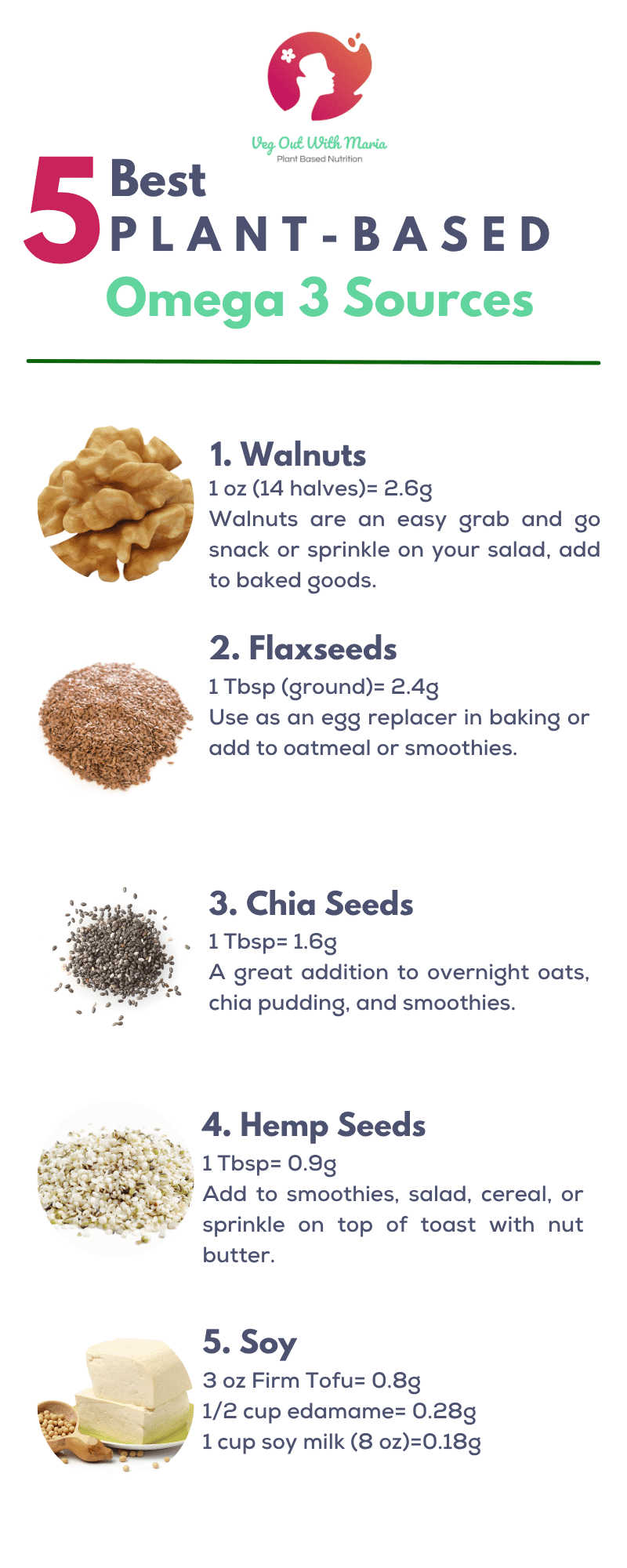
A plant based diet provides a wide variety of omega 3 (ALA) sources. Good sources include walnuts, ground flaxseeds, chia seeds, and hemp seeds. Walnuts are the only nuts with significant amounts of omega 3.
You can also find omega 3s in other plant foods such as:
- edamame
- firm tofu, tempeh and other soy products
- dark leafy greens
- Brussels sprouts, broccoli
- kidney beans
- red lentils
- wild rice
- winter squash
- spirulina
- nori
These sources are not as rich as the nuts and seeds mentioned above but they definitely contribute to your total intake.
Some plant based products are fortified with omega 3s. You can find omega 3s added to certain plant milks, firm tofu, some plant based “fish” alternatives, and other foods.
There are certain vegetable oils such as soybean and canola oil that are considered good sources of omega 3s. However, due to the high amount of fat and omega 6 content I do not consider them the best sources.
A Note About Absorption
One thing to note about omega 3 absorption is that omega 6 fats use the same enzymes as omega 3s to make the longer chain forms needed in the body. Because of this, they compete with omega 3s for conversion.
If you have more omega 6 in your diet (from sunflower, safflower, soy, sesame, and corn oils) this can impair your ability to convert ALA. Since our food supply is loaded with omega 6 oils most of us get an over-abundance in our diet.
As long as you are limiting processed and packaged foods (where there are high amounts of omega 6) your ability to convert ALA should not be compromised.
Do You Need An Omega 3 Supplement?
Recent research supports the importance of omega-3 supplements for brain health, especially for those following a plant-based diet. While plant foods provide ALA, the body’s conversion to EPA and DHA (the forms most directly linked to cognitive function) is limited. 12
Supplementing with an algae-based omega-3 can help maintain optimal DHA levels, supporting memory, mood, and long-term brain health. This can be a great addition to eating an ALA rich diet.
Algae is where fish get their omega-3s, so not only are you going directly to the source, but it’s an excellent plant-based option and a more sustainable one at that.
A couple of my favorite vegan omega-3 supplements are: Sapling* and Future Kind Foundations*, a vegan multivitamin with omega-3 (*Amazon affiliate link).
If you are curious about testing your omega-3 levels, you can purchase an omega 3 Index* home kit, which is easy to use and fairly affordable (*Amazon affiliate link).
Omega 3 Summary
Omega-3 fatty acids are essential fats your body needs for optimal heart, brain, and eye health, as well as providing anti-inflammatory benefits.
You do not have to eat fish to meet your omega-3 needs. It is easy to meet the recommended daily intake of ALA omega-3s on a plant-based diet. Adding an algae-based omega-3 supplement can help ensure you are meeting your EPA and DHA needs and protecting your brain health.
Find ways to incorporate more plant-based omega-3 sources into your diet to make sure you’re not coming up short on this important fatty acid.
Other Articles To Explore:
